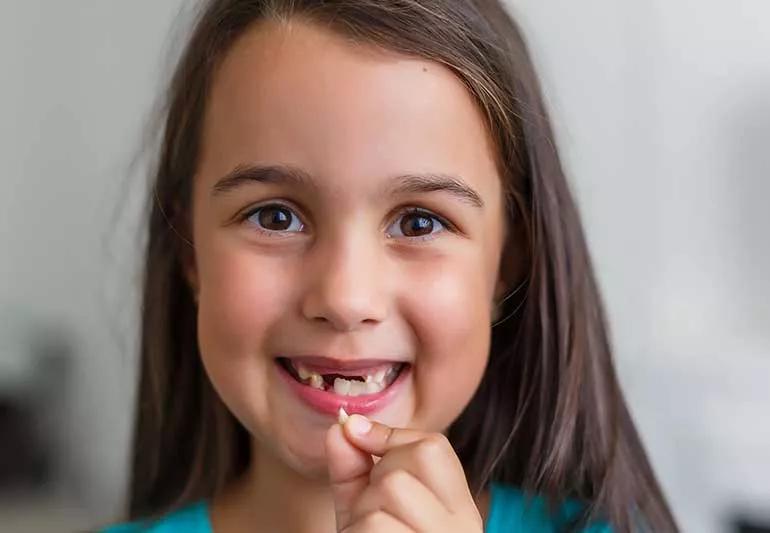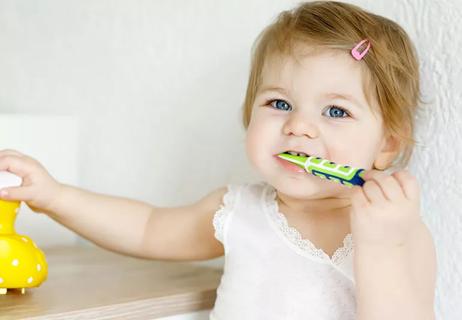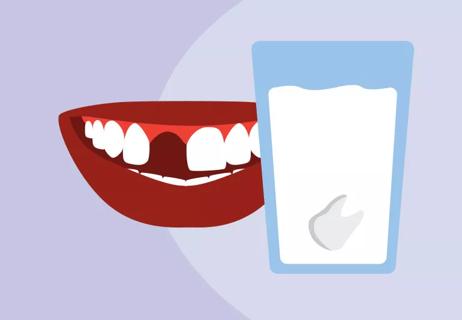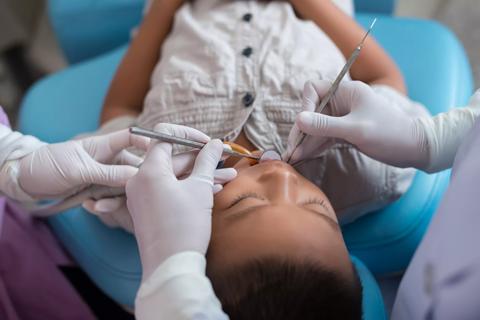The earlier they come in, the sooner they fall out

One moment, the kids we cradle are so young, and the next, they’re teenagers running off on a big adventure. But somewhere in between all that growth and character development, they go through the process of losing their baby teeth so they can grow permanent ones in their place.
Advertisement
Cleveland Clinic is a non-profit academic medical center. Advertising on our site helps support our mission. We do not endorse non-Cleveland Clinic products or services. Policy
The more you may think about the process of losing teeth, the stranger it may seem — after all, your kids are technically losing body parts. But it doesn’t have to be weird for you or your child. In fact, helping your child embrace that period of growth before they lose their first teeth is an important part of the process.
Pediatric dentist Daniel Gindi, DMD, drills down on just how many baby teeth your children will lose, when you can expect them to fall out and ways you can help encourage them.
Most kids will have 20 baby teeth by the time they’re 2 years old. Eventually, as permanent teeth grow in, they’ll lose all of their baby teeth.
“The primary function of baby teeth is to hold space for the permanent teeth and allow the jaw to grow and accommodate them as they grow into place,” explains Dr. Gindi.
Baby teeth are also structured differently from permanent adult teeth. They have wider roots, thinner enamel and a larger pulp — that jelly-like center of your tooth — that contains more nerves, blood vessels and tissue than permanent teeth.
“That’s why when we start getting kids with cavities, a lot of times, they’re already having a toothache by the time we see them,” notes Dr. Gindi. “There’s less room to travel to get to the nerves in baby teeth.”
Advertisement
When you lose a baby tooth, all that pulp dissolves along with the roots, allowing for your permanent teeth to grow in and push them up from behind.
“Every tooth that comes in comes out at a different time,” says Dr. Gindi. “The first ones in are usually your lower two front teeth, or your central incisors, and those are also usually the first ones out.”
The timeline of losing baby teeth happens differently for everyone. But in general, you can expect the first baby teeth to fall out around age 6 and the last to fall out around age 12.
Here’s a helpful chart for tracking the general fall out of baby teeth:
| Teeth | Age |
|---|---|
| Central incisors (front teeth) | 6 to 7 years |
| Lateral incisors (next to the front teeth) | 7 to 8 years |
| Canines (the pointed teeth on each side of the incisors) | 9 to 12 years |
| First premolars | 9 to 11 years |
| Second premolars | 10 to 12 years |
| Teeth | |
| Central incisors (front teeth) | |
| Age | |
| 6 to 7 years | |
| Lateral incisors (next to the front teeth) | |
| Age | |
| 7 to 8 years | |
| Canines (the pointed teeth on each side of the incisors) | |
| Age | |
| 9 to 12 years | |
| First premolars | |
| Age | |
| 9 to 11 years | |
| Second premolars | |
| Age | |
| 10 to 12 years |
“At the same time they’re starting to lose their front bottom teeth, they’re usually cutting their first molars in the back, behind all their baby teeth,” says Dr. Gindi.
In some cases, baby teeth can start falling out as early as 4 years old for some kids. For others, they can also start falling out later than usual. If this happens, there’s usually no reason for concern unless your child is losing a majority of their baby teeth early, if permanent teeth aren’t coming in at all or if they’re experiencing a great deal of pain.
“In the rarest instances, early loss of baby teeth can be a sign of systemic problems like hypophosphatemia (low phosphate levels in your blood), thyroid issues and some blood disorders,” says Dr. Gindi.
In those cases, dentists will order blood work to identify and treat any potential systemic issues causing the sudden loss of teeth. In the event that baby teeth don’t fall out on their own and permanent teeth run the risk of being impacted (or stuck in their gums), dentists can go in and extract baby teeth to allow the permanent ones to grow into place.
Your kids don’t always experience pain when they lose their baby teeth. If anything, they may experience some inflammation or “a weird and funny feeling.”
“Kids will often avoid eating in that area or point to the area and say that their tooth is bothering them or feels funny,” says Dr. Gindi. “When the first tooth comes out, it usually happens when they’re biting into something and they don’t even realize it right away. It’s usually quick and painless.”
Of course, trauma can cause teeth to become loose too early if your child falls or hurts themselves. If this happens, you should act fast and see your dentist right away as they may be able to fix it.
“If there’s been some trauma to the baby teeth, trauma can cause early resorption of the roots of the teeth and they can lose them,” warns Dr. Gindi.
Before you start tying strings from doorknobs to loose teeth, you should know there are healthier ways of encouraging children to wiggle their teeth loose. And if you’re gearing up for the very first loose tooth, the key to avoiding unnecessary anxiety around the experience is to ramp up the excitement.
Advertisement
“That’s why we have the Tooth Fairy,” says Dr. Gindi. “You don’t want to make it sound like losing teeth is a scary thing and you want to encourage them through the process. It goes against every parental instinct to tell a kid to play with their tooth or to get it out, but I encourage kids to wiggle their teeth with their tongue.”
Why? Because the longer they avoid chewing with loose teeth or the longer they don’t play with them, the more they risk their gums growing back up into their baby teeth.
“Your gums can tighten up again,” explains Dr. Gindi. “Your permanent teeth can end up coming in before the baby teeth come out, and in those cases, we may have to go in and extract the baby teeth if they don’t fall out on their own.”
Emphasizing the excitement of getting older and becoming “a big kid” is a good starting point for getting your children on board with what’s going to happen when they’re old enough to start losing teeth. And once it happens, reassuring them can make a world of difference.
If your child experiences any sort of pain or inflammation after their first tooth falls out, giving them a dose of acetaminophen (Tylenol®) or ibuprofen (Advil®) can help. If there’s any minimal bleeding, you can have them bite down on a piece of gauze for a couple of minutes to help stop the bleeding.
Advertisement
In the days that follow, you’ll want to avoid letting your child use straws, as suction can end up removing the blood clot that helps the area heal. But for the most part, you’ll want to maintain your usual routine around cleaning your child’s teeth. Gentle brushing and eating usual foods are encouraged right away. And if they continue to complain of pain, soft foods may be a good option at least in the first day or two after losing their first tooth.
“When kids don’t want to brush around loose teeth or lost teeth, you can get inflammation,” says Dr. Gindi. “We tell kids to brush as much as they can and always reinforce that hygiene is important to their health.”
That means you want to get your kids to start brushing their teeth early with toothpaste that includes fluoride. The earlier they can sign on to embracing their own dental health, the better they’ll react when their first tooth pops out.
Advertisement

Delivered every Tuesday!
Sign up for our Health Essentials emails for expert guidance on nutrition, fitness, sleep, skin care and more.
Learn more about our editorial process.
Advertisement

Study finds 80% of kids don't brush early enough

The short answer from a pediatric dentist

Act quickly to increase the chances that your tooth can be saved

Quick action is key to preventing long-term damage

Most recommended precautions center around minimizing bruising or swelling

Even one drink can have an impact on your cognitive function leading to slurred speech, blurred vision and impaired memory

Type 2 diabetes isn’t inevitable with these dietary changes

Applying a hot or cold compress can help with pain